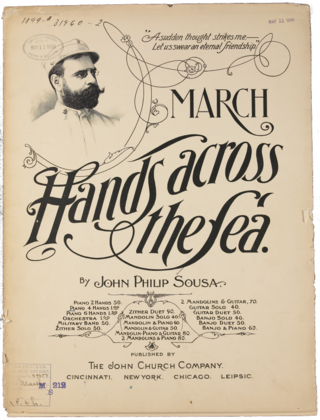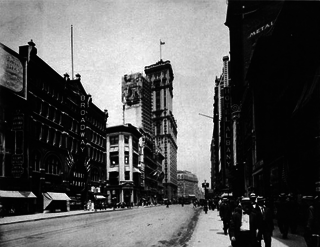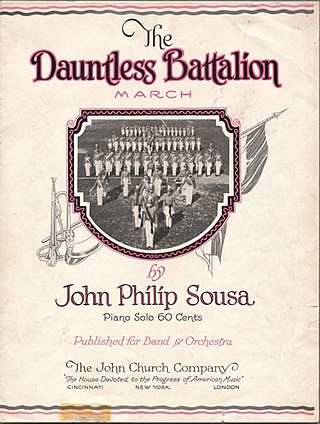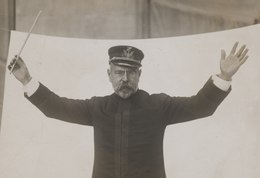
John Philip Sousa was an American composer and conductor of the late Romantic era known primarily for American military marches. He is known as "The March King" or the "American March King", to distinguish him from his British counterpart Kenneth J. Alford. Among Sousa's best-known marches are "The Stars and Stripes Forever", "Semper Fidelis", "The Liberty Bell", "The Thunderer", and "The Washington Post".

"Hands Across the Sea" is an American military march composed by John Philip Sousa in 1899.
El Capitan is the name of a rock formation in Yosemite National Park, California.
Minnesota March is a march for wind band written by John Philip Sousa in 1927 for the University of Minnesota at the request of the Minnesota football team. Sousa used Indian themes in this march, and later added field drum and bugle parts. The piece was one of four marches written by Sousa expressly for a university. It is now used as one of the university's school songs, with lyrics written in 1927 by university band director Michael Jalma. The piece is regularly performed by the University of Minnesota Marching Band and pep bands and often sung by students at various athletic events and ceremonies.

El Capitan is an operetta in three acts by John Philip Sousa and has a libretto by Charles Klein. The piece was Sousa's first successful operetta and his most successful stage work. The march "El Capitan" became a standard work both for brass bands and a crossover into other genres.

Charles Klein was an English-born playwright and actor who emigrated to America in 1883. After moving to New York City in 1883, Klein began acting. He began writing by 1890, soon working for producer Charles Frohman. Among his works was the libretto of John Philip Sousa's operetta, El Capitan (1896). He wrote melodrama and dramatic plays in the first 15 years of the 20th century.

Stars and Stripes Forever is a 1952 American Technicolor film biography of the late-19th-/early-20th-century composer and band leader John Philip Sousa. This 20th Century Fox feature was produced by Lamar Trotti, directed by Henry Koster, and stars Clifton Webb, Debra Paget, Robert Wagner, and Ruth Hussey. The film's title is taken from Sousa's "The Stars and Stripes Forever", which has become the best known of his military marches. The film was released twenty years after Sousa's death.

Glen MacDonough was an American writer, lyricist and librettist. He was the son of theater manager Thomas B. MacDonough and actress/author Laura Don. Glen MacDonough married Margaret Jefferson in 1896 in Buzzard's Bay, Massachusetts.
Ian Hobson is an English pianist, conductor and teacher, and is a professor at University of Illinois at Urbana–Champaign and at Florida State University. His pianistic repertoire spans the baroque to the contemporary, but he specialises in the Romantic repertoire. Starting September 1st 2023 he will be serving as a guest conductor of Sinfonia Varsovia.

The Broadway Theatre near 41st Street was a Manhattan theatre in operation from 1888 to 1929. It was located at 1445 Broadway.

The Charlatan is an 1898 American operetta also known as The Mystical Miss, with music and lyrics by John Philip Sousa. Today only excerpts from the work—"The Charlatan March", "The Charlatan Waltzes" and "The Charlatan Overture"—are commonly known. The operetta is set in the early nineteenth century in Russia with scenes in the village of Bohkara; at Gogol's house; and in the Grand Duke's Palace in Russia.
Paul Edmund Bierley was an American music historian. Among his awards were a Society for American Music Lifetime Achievement Award and receiving an Honorary Doctor of Music from Ohio State University.

"In Memoriam: President Garfield's Funeral March" is a funeral dirge composed by John Philip Sousa in 1881, while serving as director of "the President's Own" United States Marine Band, for the state funeral of President of the United States James Garfield. It was debuted during the committal of Garfield's remains and, 51 years later, was performed at Sousa's own funeral by the Marine Band. It is one of only two compositions Sousa dedicated to an American president, the other one being "President Garfield's Inauguration", both of which were made to Garfield.

The John Philip Sousa Baton is a conducting baton originally presented to John Philip Sousa upon his resignation as the director of the United States Marine Band. After his death, it was donated to the Marine Band, and since it has been traditionally passed to the new director from the outgoing director of the band during the change of command ceremonies.

"Nobles of the Mystic Shrine" is a march composed by John Philip Sousa upon the request of his nephew, A. R. Varela. Sousa dedicated the march to the Almas Temple and the Ancient Arabic Order of the Nobles of the Mystic Shrine. It was first conducted in June 1923, with a band of around 6,200 members—the largest Sousa had ever conducted. It is one of the few Sousa marches with the first strain written in the minor mode. Contemporary versions of the march recorded by the Ottoman military band also use the Jingling Johnny in the final strain.

Boy Scouts of America is a march composed by John Philip Sousa in 1916 upon the request of Charles D. Hart. Sousa dedicated it to the Boy Scouts of America. It was premiered in October 1916 at the Metropolitan Opera House. The cover sheet features a photograph of a statuette R. Tait McKenzie's The Ideal Scout. It is considered one of the best marches Sousa ever composed, with The Reading Times writing that the march proved that the "noted composer still retains the name of 'March King'".

"The Dauntless Battalion" is an American military march by John Philip Sousa, published in 1922 and dedicated to the faculty and cadets of the Pennsylvania Military College in Chester, Pennsylvania, known today as Widener University. Sousa received an honorary doctorate from the college in February 1920 alongside future president Warren G. Harding.













